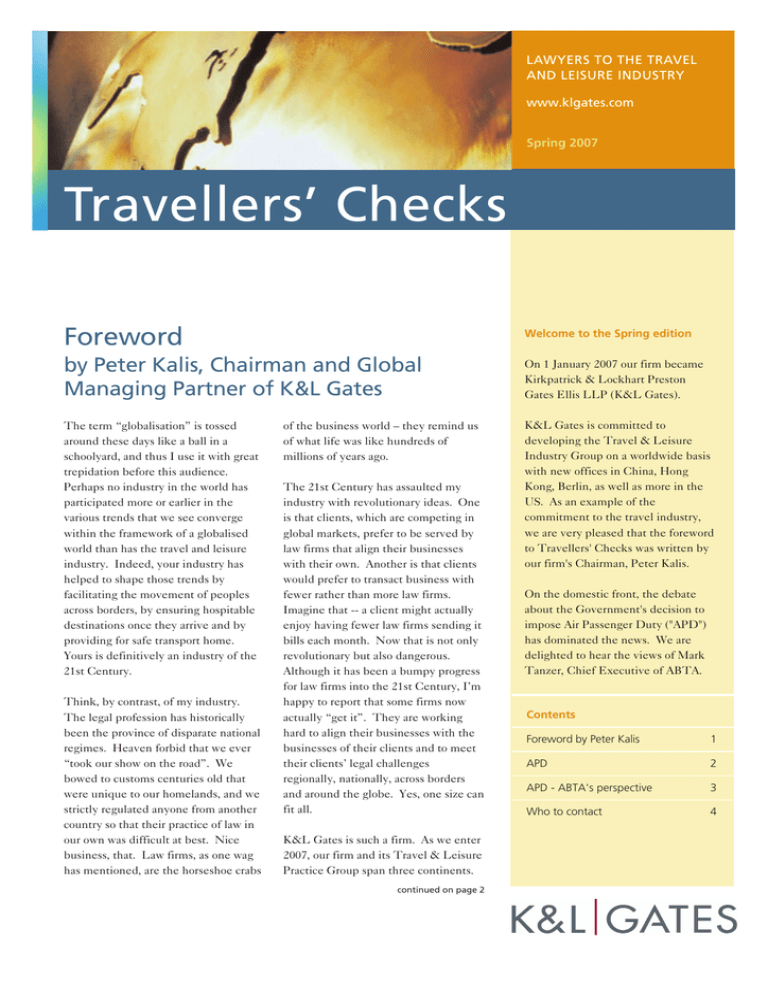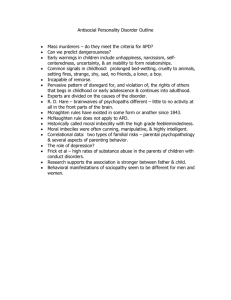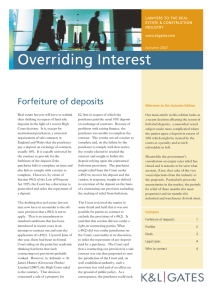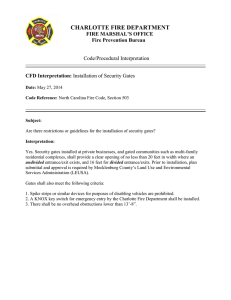
LAWYERS TO THE TRAVEL
AND LEISURE INDUSTRY
www.klgates.com
Spring 2007
Travellers’ Checks
Foreword
Welcome to the Spring edition
by Peter Kalis, Chairman and Global
Managing Partner of K&L Gates
On 1 January 2007 our firm became
Kirkpatrick & Lockhart Preston
Gates Ellis LLP (K&L Gates).
The term “globalisation” is tossed
around these days like a ball in a
schoolyard, and thus I use it with great
trepidation before this audience.
Perhaps no industry in the world has
participated more or earlier in the
various trends that we see converge
within the framework of a globalised
world than has the travel and leisure
industry. Indeed, your industry has
helped to shape those trends by
facilitating the movement of peoples
across borders, by ensuring hospitable
destinations once they arrive and by
providing for safe transport home.
Yours is definitively an industry of the
21st Century.
Think, by contrast, of my industry.
The legal profession has historically
been the province of disparate national
regimes. Heaven forbid that we ever
“took our show on the road”. We
bowed to customs centuries old that
were unique to our homelands, and we
strictly regulated anyone from another
country so that their practice of law in
our own was difficult at best. Nice
business, that. Law firms, as one wag
has mentioned, are the horseshoe crabs
of the business world – they remind us
of what life was like hundreds of
millions of years ago.
The 21st Century has assaulted my
industry with revolutionary ideas. One
is that clients, which are competing in
global markets, prefer to be served by
law firms that align their businesses
with their own. Another is that clients
would prefer to transact business with
fewer rather than more law firms.
Imagine that -- a client might actually
enjoy having fewer law firms sending it
bills each month. Now that is not only
revolutionary but also dangerous.
Although it has been a bumpy progress
for law firms into the 21st Century, I’m
happy to report that some firms now
actually “get it”. They are working
hard to align their businesses with the
businesses of their clients and to meet
their clients’ legal challenges
regionally, nationally, across borders
and around the globe. Yes, one size can
fit all.
K&L Gates is such a firm. As we enter
2007, our firm and its Travel & Leisure
Practice Group span three continents.
continued on page 2
K&L Gates is committed to
developing the Travel & Leisure
Industry Group on a worldwide basis
with new offices in China, Hong
Kong, Berlin, as well as more in the
US. As an example of the
commitment to the travel industry,
we are very pleased that the foreword
to Travellers' Checks was written by
our firm's Chairman, Peter Kalis.
On the domestic front, the debate
about the Government's decision to
impose Air Passenger Duty ("APD")
has dominated the news. We are
delighted to hear the views of Mark
Tanzer, Chief Executive of ABTA.
Contents
Foreword by Peter Kalis
1
APD
2
APD - ABTA's perspective
3
Who to contact
4
Travellers’ Checks
APD
continued from page 1
With 22 offices from Berlin to Beijing –
with various rest stops along the way
bearing names such as London, New
York, Miami, Hong Kong, San
Francisco and more – K&L Gates is
designed to meet the needs of the
travel and leisure industry. Truth be
known, we mined your industry for
wisdom on how to configure our
business, and we found rich veins of
experience, insight and good judgment.
We now hope that you look into a
mirror and, with a little imagination,
see K&L Gates.
Please enjoy these pages as evidence of
our knowledge of and commitment to
your industry and of our willingness to
serve. And, also, as a sign of our
appreciation for showing us the way in
this globalised world.
APD is an excise duty which is levied
on the carriage, from a UK airport, of
chargeable passengers on chargeable
aircraft. APD came into effect on 1
November 1994. Provided that the
operator is an Air Transport
Undertaking, a chargeable passenger is
anyone carried on the aircraft with the
exception of some exemptions (e.g.
flight crew, cabin attendants,
employees escorting a passenger or
goods or undertaking repair,
maintenance, safety or security work).
Most aircraft operators will be Air
Transport Undertakings. The Air
Navigation Order 1982 defines an Air
Transport Undertaking as "any
undertaking whose business includes
the carriage by air of passengers or
cargo for valuable consideration". All
aircraft (including helicopters) which
are designed or adopted to carry
persons in addition to the flight crew
are chargeable with the exception of
small aircraft and private aircraft.
As announced in the Chancellor's preBudget report, APD is set to double
from 1 February 2007. APD will rise
from £5 to £10 for economy flights in
the EU, and from £40 to £80 for the
more expensive long-haul flights. The
new rates of duty will apply to flights
taken on or after 1 February 2007, and
will come into effect regardless of
whether they were booked before 6
December 2006, the date of the prebudget report.
The increase was introduced largely
because the Government does not
think that the aviation industry is
meeting its environmental costs. The
rise should see income from duty
increase to £2 billion to pay for extra
resources in public transport and the
environmental sector.
Several leading airlines have sought to
make their passengers pay the price for
the Government's green agenda. Both
Ryanair and Easyjet, have said that
they were e-mailing passengers who
had booked flights before 6 December
2006 for travel after 1 February 2007,
asking them to pay the higher rate of
tax.
The issue is complicated, however, and
airlines are divided in their approach in
dealing with passengers who refuse to
pay the higher tax. Ryanair, which has
an exposure of about £1.25m with
250,000 flights affected, said that if
passengers refused to pay, they would
not be allowed to fly but would be
eligible for a complete refund of the
fare. Easyjet said that it had e-mailed
passengers requesting the payment but
2
SPRING 2007
www.klgates.com
was still undecided on how to deal with
non-paying passengers. Easyjet has a
bigger presence in the UK market than
Ryanair and said that about 800,000
flights were affected, creating a
financial exposure of about £4m. Virgin
Atlantic said it had also decided to
claim the tax from passengers but was
still undecided on how best to collect
it. British Airways had previously
announced that it would not pass on
the tax to customers who had already
booked their travel and it would absorb
the additional £11m cost, partly
because of the complexity of the task.
The low-cost carriers can contact their
passengers simply as about 98 per cent
of bookings are made through the
internet and they have e-mail addresses
readily available. Carriers such as BA
and Virgin, however, still take a lot of
their bookings through other channels
such as travel agents and call centres
making contact much more difficult.
Some carriers are considering collecting
APD from passengers checking-in,
which will bring with it a host of
practical difficulties. We set out below
ABTA's position in an article by Mark
Tanzer, ABTA's Chief Executive.
APD - ABTA's perspective
by Mark Tanzer, Chief Executive of ABTA
It was widely speculated before the
Chancellor’s pre-Budget Report in
December that Air Passenger Duty
(APD) would be increased and, as
predicted, the Chancellor announced a
doubling of the rates. What nobody
expected was that the new rates would
apply from 1st February – a complete
change from the precedent set by
earlier APD increases. When APD had
been increased previously the travel
industry was given almost twelve
months lead-in time, however, the lead
in time was less than two months.
ABTA made it clear in its press release
and media interviews that the increase
in APD did nothing for the
environment. We described it as a
punitive measure, designed to drive
down consumer demand for travel.
ABTA also added that the funds raised
by APD were, in our opinion, not used
to offset the environmental
consequences of mass travel but were
subsumed within the Treasury’s coffers
to fund projects other than
environmental projects. We also felt
that APD did nothing to encourage the
more efficient fuel use through
improved technology or fuller planes.
Rather than raising APD we clearly felt
that the Government should be looking
at supporting the inclusion of the
aviation industry in the EU Emissions
Trading Scheme - this is not just
ABTA’s view but it is the view of many
in the travel industry. This is clearly
seen as a sensible way forward for an
industry that wants to take action to
improve its environmental footprint.
One of the effects of the increase and
implementation date, which we feel
the Government was unaware at the
time it made its announcement, was
that over 4 million bookings, which
involve departure dates on or after 1st
February, had already been taken by
travel agents and tour operators before
the PBR announcement was made.
ABTA are extremely concerned that its
Members will have to meet the full
cost of the increased tax on these
flights since they fall within the aegis
of the Package Travel, Package
Holidays and Package Tours
Regulations 1992 (SI 1992 No. 3288)
which stipulate that they are forbidden
from passing on the additional costs.
This will mean that the industry will
have to find somewhere in the region
of £100m to fund the shortfall.
Although ABTA is aware that there are
a number of precedents for tax
increases to be announced on the day
of a PBR or Budget, which come into
immediate effect, it is usual for these to
apply only on transactions entered into
after the announcement has been made
(eg petrol prices). In the case of the
APD announcement this is
retrospective and affects transactions
that had already been made.
continued on page 4
SPRING 2007
3
Travellers’
Checks
Travellers’ Checks
continued from page 3
ABTA, along with others in the
industry, are in dialogue with
Government asking them to look again
at the way in which this increase is
being applied. One of the options we
have put on the table for discussion is
whether the increase could be deferred
until after this summer’s holiday
season, or at the least, ensure that those
flights already booked before the PBR
announcement are not included at the
increased rate.
Forthcoming Event
We are delighted to be sponsoring and speaking at ABTA’s Travel Law seminar on 17 and 18 April 2007. For programme
details and to make a booking, please contact events@abta.co.uk.
Who to Contact
K&L Gates
For further information contact
110 Cannon Street
Cynthia Barbor
cynthia.barbor@klgates.com
T: +44 (0)20 7360 8170
London EC4N 6AR
Laura Harcombe
laura.harcombe@klgates.com
T: +44 (0)20 7360 8186
www.klgates.com
T: +44 (0)20 7648 9000
F: +44 (0)20 7648 9001
K&L Gates comprises approximately 1,400 lawyers in 22 offices located in North America, Europe and Asia, and represents capital markets participants, entrepreneurs, growth and middle market
companies, leading FORTUNE 100 and FTSE 100 global corporations and public sector entities. For more information, please visit www.klgates.com.
K&L Gates comprises multiple affiliated partnerships: a limited liability partnership with the full name Kirkpatrick & Lockhart Preston Gates Ellis LLP qualified in Delaware and maintaining offices
throughout the U.S., in Berlin, and in Beijing (Kirkpatrick & Lockhart Preston Gates Ellis LLP Beijing Representative Office); a limited liability partnership (also named Kirkpatrick & Lockhart Preston
Gates Ellis LLP) incorporated in England and maintaining our London office; a Taiwan general partnership (Kirkpatrick & Lockhart Preston Gates Ellis) which practices from our Taipei office; and a
Hong Kong general partnership (Kirkpatrick & Lockhart Preston Gates Ellis, Solicitors) which practices from our Hong Kong office. K&L Gates maintains appropriate registrations in the
jurisdictions in which its offices are located. A list of the partners in each entity is available for inspection at any K&L Gates office.
This publication/newsletter is for informational purposes and does not contain or convey legal advice. The information herein should not be used or relied upon in regard to any particular facts or
circumstances without first consulting a lawyer.
Data Protection Act 1998 - We may contact you from time to time with information on Kirkpatrick & Lockhart Preston Gates Ellis LLP seminars and with our regular newsletters, which may be of
interest to you. We will not provide your details to any third parties. Please e-mail london@klgates.com if you would prefer not to receive this information.
4
SPRING 2007
©1996-2007 Kirkpatrick & Lockhart Preston Gates Ellis LLP. All Rights Reserved.





